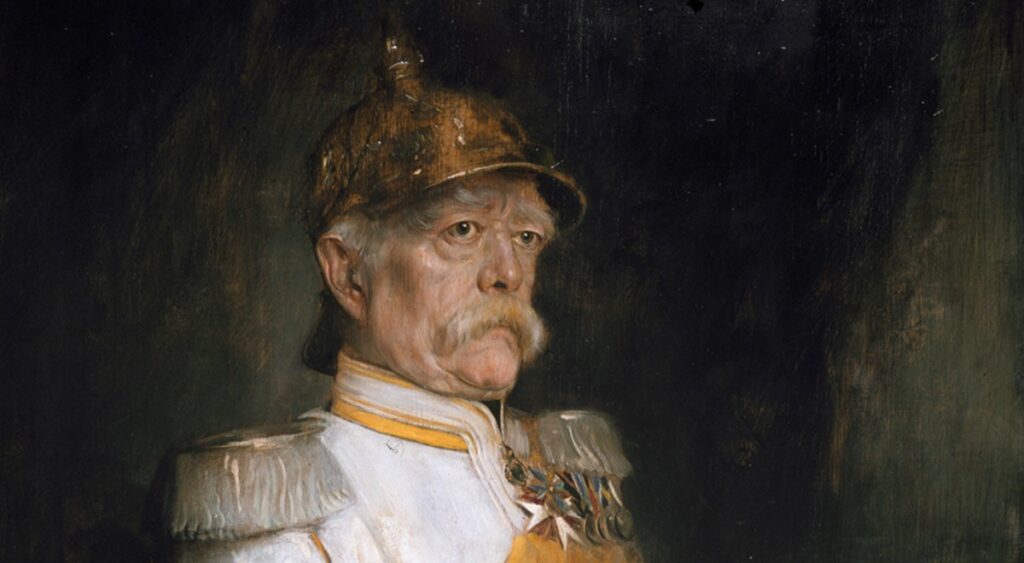
Otto von Bismarck
The name of Otto von Bismarck reverberates throughout European history, not only as a politician but also as a brilliant strategist who brought Germany together, maintained peace for many years, and permanently altered the political landscape of the continent. Bismarck, also referred to as the Iron Chancellor, had a significant impact that went well beyond his own era. An understanding of his political approach can provide important insights into the nature of leadership, diplomacy, and power. This article examines how Otto von Bismarck used Realpolitik, decisive actions, and meticulous planning to shape modern-day Europe.
The Formative Years of a Political Superstar
Otto von Bismarck was born in Schönhausen, Prussia, in 1815, and was raised in a traditional aristocratic home. Despite his initial legal studies, politics was his true vocation. A strong devotion to monarchy and a keen scepticism of liberal and nationalist movements characterised his early career.
When Bismarck was named Prussia’s prime minister in 1862, he was already known for his cunning, brutality, and unwavering devotion to the Prussian throne. But it was not only his loyalty that distinguished him; it was also his vision of a united Germany under Prussian leadership rather than Austrian or, most definitely, revolutionary control.
Bismarck’s signature strategy in realpolitik
A strategy known as “Realpolitik,” which is still used (and occasionally misinterpreted) today, was at the core of Otto von Bismarck’s political genius. According to Bismarck, politics was about timing, power dynamics, and attainable goals rather than grandiose ideals or philosophical arguments. According to Bismarck, a leader should use the resources that reality offers, not the ones they wish were available. He frequently changed alliances, manipulated media narratives, and even went to war when necessary, always adapting his tactics to fit the situation.
This is perfectly encapsulated in one of his most well-known quotations:
Politics is the art of the next best, the art of what is feasible and achievable.
Bringing Germany Together Through Three Wars
Unifying Germany in 1871 was Bismarck’s most audacious and enduring accomplishment. However, three well-planned wars were necessary for it to occur; peaceful negotiation was not the solution.
In the Danish War (1864), Bismarck formed an alliance with Austria in order to take the Danish duchies of Schleswig and Holstein. He gained territory as a result, and he also had an excuse to later attack Austria. As anticipated, tensions with Austria sparked hostilities during the Austro-Prussian War (1866). In an early indication of his political restraint, Bismarck made sure that Prussia came to power without destroying Austria.
In the Franco-Prussian War (1870–71), Bismarck provoked France by manipulating diplomatic communications, including the well-known “Ems Dispatch.” German nations united behind Prussia when the war started, leading to victory and the establishment of the German Empire in the Palace of Versailles. These wars were a result of strategy in action rather than rash aggression. Bismarck displayed great discipline and shrewdness in achieving unification without going too far.
Chancellor of Peace
Many people anticipated further growth or conflict after the German Empire was established. To their surprise, Bismarck changed his focus to maintaining peace.
His attention turned to diplomatic balancing acts, establishing intricate coalitions aimed at preventing war between the main European powers and isolating France. Relative stability was maintained throughout the continent during this time, which is frequently referred to as the Bismarckian System.
Among the significant diplomatic actions were:
Russia, Germany, and Austria-Hungary formed the League of the Three Emperors.
Austria-Hungary and the Dual Alliance
The Triple Alliance with Italy, Austria-Hungary, and
By means of these treaties, Bismarck made Germany the centre of a stable, albeit precarious, European order.
Domestic Policy: Calculated but Conservative
Bismarck was a realist in terms of domestic policy even though he was not a supporter of liberalism or socialism. He established some of the earliest welfare programs in Europe in an effort to quell the growing popularity of socialist movements, such as:
Medical insurance (1883)
insurance for accidents (1884)
Pensions for old people (1889)
These laws were the result of strategy rather than altruism. In another successful Realpolitik move, Bismarck attempted to subdue revolutionary fervour by appropriating it. Fearing that papal influence might erode national unity, he also fought the Catholic Church during the Kulturkampf (or “Culture Struggle”). Despite the campaign’s eventual failure, it showed his conviction that no organisation should challenge the state’s authority.
Fall and Legacy
Despite his enormous influence, Bismarck’s reign came to an end in 1890 when he was fired by Wilhelm II, the new Kaiser. Bismarck’s alliances started to fall apart without his steady hand, which ultimately contributed to the events leading up to World War I. But his legacy persisted. In addition to uniting Germany, Bismarck had spent twenty years controlling the shifting balance of power in Europe. His techniques are still being studied in leadership seminars, political science departments, and military academies.
The Reasons Bismarck Is Still Important
Otto von Bismarck provides a classic example of practical leadership in the age of rapid change and ideological division. Many modern leaders could take a cue from his ability to read the political landscape, react nimbly to threats, and accomplish long-term objectives without losing control. He was never an idealist or populist, but he was successful, and his influence changed Europe.
Conclusion
Otto von Bismarck engineered his ascent to power rather than just gaining it. He achieved what others thought was impossible thanks to his Realpolitik-based political strategy. Bismarck was a warrior and diplomat, a conservative and an innovator, and he worked to unite Germany and maintain peace throughout Europe. Otto von Bismarck’s life and legacy are still more important than ever as the world struggles with issues of national interest, diplomacy, and power.





